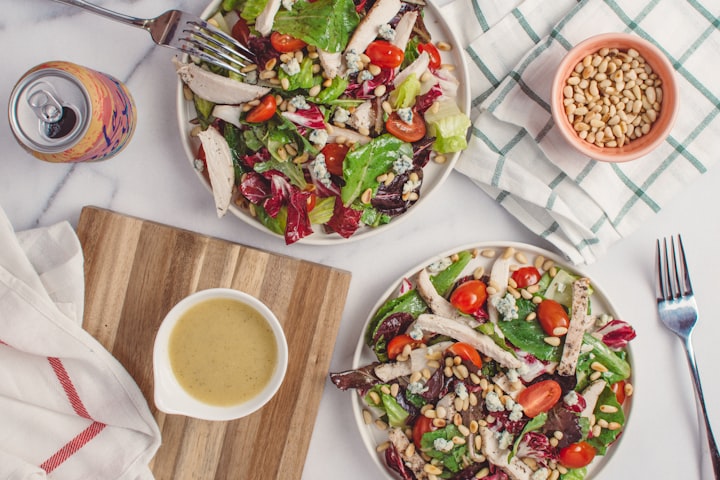How to maintain a healthy and balanced diet.
Healthy Living

I. Introduction
A. Importance of a healthy and balanced diet
Eating a healthy and balanced diet is essential for overall physical and mental wellbeing. It provides the body with the necessary nutrients, vitamins, and minerals to function properly, boost immunity, and prevent chronic diseases. A healthy diet can also improve mood, increase energy levels, and contribute to weight management.
B. Definition of a healthy and balanced diet
A healthy and balanced diet is one that contains a variety of foods from all food groups in the right proportions. It should include plenty of fruits and vegetables, whole grains, lean proteins, and healthy fats. Additionally, a healthy diet should be low in added sugars, unhealthy fats, and salt.
C. Purpose of the blog
The purpose of this blog is to educate readers on the importance of a healthy and balanced diet and to provide practical tips and information on how to achieve it. The blog will cover topics such as understanding the macronutrients, incorporating fruits and vegetables into your diet, making informed food choices, staying hydrated, planning and preparation, and balancing indulgences. The goal is to empower readers to make positive changes to their diet and improve their overall health and wellbeing
II. Understanding the macronutrients
A. Carbohydrates
Carbohydrates are an important source of energy for the body and are found in foods such as fruits, vegetables, grains, and legumes. There are two types of carbohydrates: simple and complex. Simple carbohydrates, such as sugar and sweets, are quickly absorbed by the body and provide a quick burst of energy. Complex carbohydrates, such as those found in whole grains, take longer to digest and provide sustained energy.
B. Proteins
Proteins are essential for growth and repair of the body's tissues and are also a source of energy. They can be found in foods such as meat, poultry, fish, eggs, dairy products, beans, and nuts. It is important to consume a variety of protein sources to ensure that the body receives all of the essential amino acids it needs.
C. Fats
Fats are an important part of a healthy diet, as they provide energy, absorb and transport vitamins, and insulate and protect the body's organs. There are two types of fats: healthy and unhealthy. Healthy fats, such as those found in nuts, seeds, and avocados, are essential for good health. Unhealthy fats, such as those found in fried foods and processed snacks, can increase the risk of chronic diseases.
D. Importance of macronutrient balance
It is important to consume a balance of macronutrients, as each plays a unique role in the body. Consuming too much or too little of one macronutrient can have negative health effects. For example, consuming too many simple carbohydrates can lead to rapid spikes and drops in blood sugar levels, while consuming too much unhealthy fat can increase the risk of heart disease.
III. Incorporating Fruits and Vegetables into Your Diet
A. Benefits of Consuming Fruits and Vegetables
Fruits and vegetables are a critical component of a healthy and balanced diet. They are low in calories, high in fiber, and packed with essential vitamins, minerals, and antioxidants. Consuming a diet rich in fruits and vegetables has been linked to a reduced risk of chronic diseases, such as heart disease, stroke, and some forms of cancer.
B. Tips for Including More Fruits and Vegetables in Your Diet
Incorporating more fruits and vegetables into your diet can be simple and delicious. Here are some tips to help you get started:
Make half of your plate fruits and vegetables at each meal.
Keep a variety of fruits and vegetables on hand for snacking.
Try new fruits and vegetables to find new favorites.
Add chopped or pureed fruits and vegetables to sauces and soups.
Use fruits and vegetables as a base for meals, such as a vegetable stir-fry or a fruit smoothie bowl.
C. Understanding Serving Sizes
It is important to understand serving sizes when it comes to fruits and vegetables. A serving size of fruit is typically one medium-sized fruit or 1/2 cup of cut fruit. A serving size of vegetables is 1 cup raw or 1/2 cup cooked. Aiming to eat at least 5 servings of fruits and vegetables per day is a great goal to strive for.
IV. Making informed food choices
A. Understanding food labels
Reading food labels is a key part of making informed food choices. Food labels provide information about the serving size, calorie content, and the amount of various nutrients, such as fat, carbohydrates, and protein, in a food product. Understanding how to interpret food labels can help you make healthier choices and avoid foods that are high in unhealthy ingredients.
B. Choosing whole foods over processed foods
Whole foods are minimally processed and contain few, if any, added ingredients. They include fruits, vegetables, whole grains, legumes, and lean proteins. Processed foods, on the other hand, often contain added sugars, unhealthy fats, and artificial ingredients, and can be high in calories. Choosing whole foods over processed foods is a great way to improve your diet and overall health.
C. Limiting unhealthy fats, sugar, and salt
Limiting unhealthy fats, added sugars, and salt is an important part of maintaining a healthy and balanced diet. Unhealthy fats can increase the risk of chronic diseases, such as heart disease and stroke. Added sugars and salt can lead to weight gain and contribute to high blood pressure. When shopping, look for foods that are low in unhealthy fats, added sugars, and salt, and read food labels carefully to make informed choices.
V. Staying Hydrated
A. Importance of Drinking Enough Water
Staying hydrated is a crucial part of maintaining a healthy and balanced diet. Water helps to regulate body temperature, transport nutrients, and remove waste. It is also essential for digestion and for keeping the skin looking healthy. However, many people do not drink enough water throughout the day, which can lead to dehydration and negatively impact overall health.
B. Tips for Staying Hydrated Throughout the Day
Here are some tips to help you stay hydrated:
Keep a water bottle with you throughout the day.
Drink water before, during, and after physical activity.
Eat water-rich fruits and vegetables, such as watermelon and cucumber.
Limit or avoid sugary drinks, such as soda and fruit juice, which can dehydrate the body.
Listen to your body and drink water when you feel thirsty.
C. Alternative Beverages to Water
While water is the best source of hydration, there are also other beverages that can help to keep you hydrated. These include unsweetened tea, herbal tea, and coconut water. Just be sure to check the labels, as some teas and coconut water can contain added sugars. Sports drinks can be beneficial for hydration during intense physical activity, but they should be consumed in moderation, as they can be high in calories and sugar.
VI. Planning and Preparation
A. Meal Planning
Meal planning is a crucial step in maintaining a healthy and balanced diet. By planning your meals and snacks in advance, you can ensure that you have the necessary ingredients on hand, reduce food waste, and save time and money. Meal planning also helps to prevent last-minute trips to the drive-thru or the vending machine for an unhealthy snack.
B. Preparing Healthy Meals and Snacks
Preparation is key to eating a healthy and balanced diet. Here are some tips to help you prepare healthy meals and snacks:
Cook at home as often as possible.
Use healthy cooking methods, such as grilling, roasting, and steaming.
Make double portions of meals and freeze the leftovers for quick and easy meals on busy nights.
Cut up fruits and vegetables and store them in the refrigerator for easy snacking.
Plan healthy snacks, such as carrot sticks and hummus or apple slices and almond butter, to have on hand when you get hungry.
C. Eating on the Go
Eating on the go can be challenging, but it doesn't have to be. Here are some tips for eating healthy while you're on the go:
VII. Balancing Indulgences
A. Understanding Moderation
Indulging in your favorite treats is a normal part of life, but it's important to do so in moderation. Moderation means eating a variety of foods and not depriving yourself of the foods you love, but also not overindulging to the point where it negatively impacts your health. A balanced diet should include a mix of healthy foods, such as fruits and vegetables, whole grains, and lean protein, as well as occasional indulgences in moderation.
B. Incorporating Treats into a Balanced Diet
Here are some tips for incorporating treats into a balanced diet:
Practice portion control.
Indulge in moderation, such as having a small serving of your favorite dessert once a week.
Make healthier versions of your favorite treats, such as baking cookies with whole grain flour and reducing the amount of sugar.
Try to balance indulgences with physical activity.
C. Finding Healthy Alternatives to Unhealthy Indulgences
There are many healthy alternatives to unhealthy indulgences. Here are a few suggestions:
Instead of a sugary snack, try fresh fruit or a small serving of dried fruit.
Instead of fried foods, try grilled or baked options.
Instead of soda, try flavored sparkling water or unsweetened iced tea.
Instead of high-fat dairy products, try lower-fat dairy options or non-dairy alternatives.
VIII. Conclusion
A. Recap of Key Points
In this article, we discussed the importance of maintaining a healthy and balanced diet. We covered the macronutrients - carbohydrates, proteins, and fats, and the importance of finding a balance between them. We also discussed making informed food choices, incorporating fruits and vegetables into your diet, staying hydrated, planning and preparation, and balancing indulgences.
B. Encouragement to Make Positive Changes
Making positive changes to your diet can be challenging, but it is achievable with the right mindset and resources. Take small steps towards your goal, such as incorporating one additional serving of fruits and vegetables into your daily diet or switching to water instead of sugary beverages. These small changes can have a big impact on your overall health and wellbeing.
C. Final Thoughts
Eating a healthy and balanced diet is crucial for maintaining good health and preventing chronic illnesses. By understanding the macronutrients, making informed food choices, staying hydrated, and finding a balance between indulgences and healthy foods, you can easily maintain a diet that supports your overall health and wellbeing. Remember, small changes can lead to big results, so start today and enjoy the benefits of a healthy and balanced diet.
Click here now to find out the best weight loss supplement.
About the Creator
Chibuike Oduali
I am an engineer, a business coach and a copywriter.






Comments
There are no comments for this story
Be the first to respond and start the conversation.